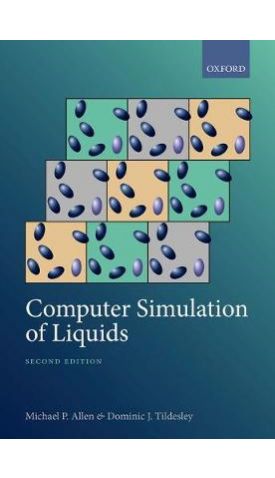אנו משתמשים ב-Cookies כדי לשפר את החוויה שלך. כדי לקיים ההנחיה החדשה של e-Privacy, עלינו לבקש את הסכמתך להגדיר את ה-Cookies. קבלת מידע נוסף.
297.00 ₪
Computer Simulation of Liquids 2nd Revised edition
297.00 ₪
ISBN13
9780198803201
יצא לאור ב
Oxford
מהדורה
2nd Revised edition
עמודים
640
פורמט
Paperback / softback
תאריך יציאה לאור
22 ביוני 2017
This is the second edition of a widely used practical guide to computer simulations of liquids. The technique uses a model for the way molecules interact, to predict how large numbers of them behave in liquid state. This essential introduction to this rapidly growing field is complete with illustrative computer code.
This book provides a practical guide to molecular dynamics and Monte Carlo simulation techniques used in the modelling of simple and complex liquids. Computer simulation is an essential tool in studying the chemistry and physics of condensed matter, complementing and reinforcing both experiment and theory. Simulations provide detailed information about structure and dynamics, essential to understand the many fluid systems that play a key role in our daily lives:
polymers, gels, colloidal suspensions, liquid crystals, biological membranes, and glasses. The second edition of this pioneering book aims to explain how simulation programs work, how to use them, and how to interpret the results, with examples of the latest research in this rapidly evolving field.
Accompanying programs in Fortran and Python provide practical, hands-on, illustrations of the ideas in the text.
| מהדורה | 2nd Revised edition |
|---|---|
| עמודים | 640 |
| פורמט | Paperback / softback |
| ISBN10 | 0198803206 |
| יצא לאור ב | Oxford |
| תאריך יציאה לאור | 22 ביוני 2017 |
| תוכן עניינים | 1: Introduction 2: Statistical mechanics 3: Molecular dynamics 4: Monte Carlo methods 5: Some tricks of the trade 6: Long-range forces 7: Parallel simulation 8: How to analyse the results 9: Advanced Monte Carlo methods 10: Rare event simulation 11: Nonequilibrium molecular dynamics 12: Mesoscale methods 13: Quantum simulations 14: Inhomogeneous fluids App. A Computers and computer simulation App. B Reduced units App. C Calculation of forces and torques App. D Fourier transforms and series App. E Random numbers App. F Configurational temperature |



Login and Registration Form